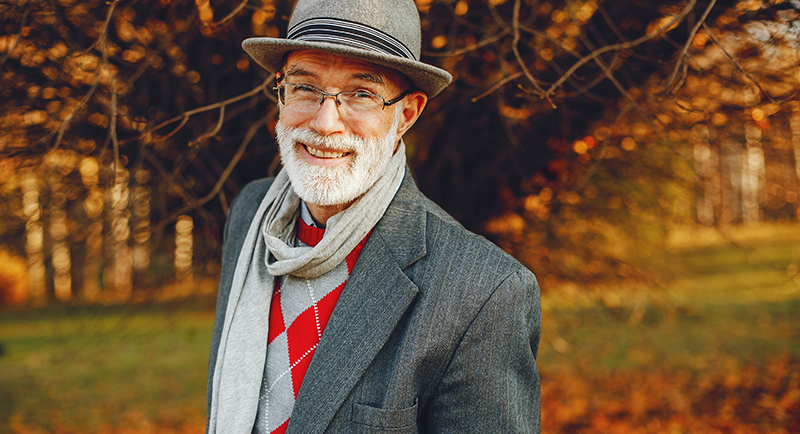Living a vibrant life after prostate cancer
Living a life that’s meaningful with a purpose is a vibrant life. But to live that life well also means maintaining good health with energy and a good attitude to go with it. After beating the challenges of a prostate cancer diagnosis, the first thing most men want to do is to get on with their life. And that can mean many different things for any man who’s faced this disease and won the battle. Some men will know what they want to do. They may have a plan all mapped out; however, other men may need some nudging.
Either way, men can still have a good quality of life after prostate cancer. And for men who are unsure how to achieve that, read on.
All cancer patients will have some adjustments after being given the “all clear” signal from their doctor. It’s a euphoric feeling to know you’ve survived the rigors of cancer treatment, and now, you have been allowed to make adjustments that reflect the life you want to live. Here are several ideas on how to approach this stage after beating back prostate cancer for a vibrant quality of life:
- Practice better bladder control
Some men may experience bladder issues after prostate cancer, such as the urge to go pee all the time, having a weak stream, or urine leakage. These side effects should go away soon after treatment, but sometimes, they linger longer than usual. Some steps men can take to improve bladder control include:
- Practicing Kegel exercises to strengthen the pelvic floor
- Ask your doctor what prescription medications are suitable for better bladder control
- Avoid drinking fluids at least 3 hours before bedtime
- Talk to your doctor about changes to your sex life
Men, who had surgery to treat prostate cancer, can have sex. But it will be different. The difference is that when the prostate gland is removed, you can still have a pleasurable orgasm without any ejaculation fluid. Erectile dysfunction (ED) is another potential issue many men face initially after treatments. The best advice is for men to speak with their doctor about recovering from ED, which may include medications, implants, or other devices to help make sex satisfying.
- Exercise regularly
There are numerous benefits of being physically active, including improving your chances of staying healthy after cancer treatment. In addition, establishing an exercise routine can help you stay on track which benefits your immunity, improves sleep, reduces stress, enhances heart health, and can maintain weight loss.
- Eat a healthy diet
You are what you eat. If your dietary habits before cancer were not the best, it’s never too late to choose nutrient-dense foods enhancing your immune system and lower your risk of cancer returning. One of the best ways of eating is to follow a Mediterranean-style diet. This includes plenty of vitamin- and anti-oxidant-rich fruits and vegetables, whole grains, nuts, seeds, fatty fish, low-fat dairy, and minimal portions of lean red meat.
- Stay up-to-date with follow-up care
Ongoing cancer care is a necessary part of staying healthy. This means keeping all your medical appointments with your urologist and oncologist, along with staying up-to-date on vaccinations, annual physicals with your primary care doctor, and taking any prescribed medications. These follow-up visits are also important for discussing any signs or symptoms to watch out for, indicating a possible cancer recurrence.
- Manage stress and get sufficient rest
Rest and relaxation go hand-in-hand. It can be difficult to rest well when stressed out. Have a plan to practice relaxing throughout the day. Try deep breathing, yoga, doing a favorite hobby, or taking a walk. When stress is under control, the ability to sleep well is also enhanced.
- Find a new normal
Going through prostate cancer is life-changing. It’s normal to have bodily changes, feel less masculine, or lower self-esteem. However, all men who’ve gone through prostate cancer admit that finding a new normal can be difficult but necessary to move forward. Give yourself time since it takes time when adjusting to life without cancer. If you become depressed or overly anxious, it may be time to seek professional mental health counseling or to join a prostate cancer support group. Simply talking to other men or health professionals can be the best answer to living a long, happy life, cancer-free.
Dr. David Samadi is the Director of Men’s Health and Urologic Oncology at St. Francis Hospital in Long Island. He’s a renowned and highly successful board certified Urologic Oncologist Expert and Robotic Surgeon in New York City, regarded as one of the leading prostate surgeons in the U.S., with a vast expertise in prostate cancer treatment and Robotic-Assisted Laparoscopic Prostatectomy. Dr. Samadi is a medical contributor to NewsMax TV and is also the author of The Ultimate MANual, Dr. Samadi’s Guide to Men’s Health and Wellness, available online both on Amazon and Barnes & Noble. Visit Dr. Samadi’s websites at robotic oncology and prostate cancer 911.

